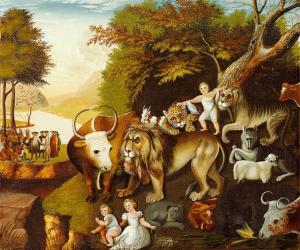| Author: | Opie Percival Read | ISBN: | 9781465507969 |
| Publisher: | Library of Alexandria | Publication: | March 8, 2015 |
| Imprint: | Language: | English |
| Author: | Opie Percival Read |
| ISBN: | 9781465507969 |
| Publisher: | Library of Alexandria |
| Publication: | March 8, 2015 |
| Imprint: | |
| Language: | English |
LOOKING BACK AT EARLY LIFE. When the slow years of youth were gone and the hastening time of manhood had come, the first thing that Henry DeGolyer, looking back, could call from a mysterious darkness into the dawn of memory was that he awoke one night in the cold arms of his dead mOther. That was in New Orleans. The boy's father had aspired to put the face of man upon lasting canvas, but appetite invited whisky to mix with his art, and so upon dead walls he painted the trade-mark bull, and in front of museums he exaggerated the distortion of the human freak. After the death of his mOther, the boy was taken to the Foundlings' Home, where he was scolded by women and occasionally knocked down by a vagabond older than himself. Here he remembered to have seen his father but once. It was a Sunday when he came, years after the gentle creature, holding her child in her arms, had died at midnight. The painter laughed and cried and begged an old woman for a drink of brandy. He went away, and after an age had seemed to pass the matron of the place took the boy on her lap and told him that his father was dead, and then, putting him down, she added: "Run along, now, and be good." The boy was taken by an old Italian woman. In after years he could not determine the length of time that he had lived in her wretched home, but with vivid brightness dwelled in his memory the morning when he ran away and found a free if not an easy life in the newsboys' lodging-house. He sold newspapers, he went to a night school, and as he grew older he picked up "river items" for an afternoon newspaper. His hope was that he might become a "professional journalist," as certain young men termed themselves; and study, which in an ill-lighted room, tuned to drowsiness by the buzzing of youthful mumblers, might have been a chafing task to one who felt not the rowel of a spurring ambition, was to him a pleasure full of thrilling promises. To him the reporter stood at the high-water mark of ambition's "freshet." But when years had passed and he had scrambled to that place he looked down and saw that his height was not a dizzy one. And instead of viewing a conquered province, he saw, falling from above, the shadows of trials yet to be endured. He worked faithfully, and at one time held the place of city editor, but a change in the management of the paper not only reduced him to the ranks, but, as the saying went, set him on the sidewalk. Then he wrote "specials." His work was bright, original and strong, and was reproduced throughout the country, but as it was not signed, the paper alone received the credit. Year after year he lived in this unsettled way—reading in the public library, musing at his own fireside, catching glimpses of an important work which the future seemed to hold, and waiting for the outlines of that work to become more distinct; but the months went by and the plan of the work remained in the shadow of the coming years. DeGolyer had now reached that time of life when a wise man begins strongly to suspect that the past is but a future stripped of its delusions. He was a man of more than ordinary appearance; indeed, people who knew him, and who believed that size grants the same advantages to all vocations, wondered why he was not more successful. He was tall and strong, and in his bearing there was an ease which, to one who recognizes not a sleeping nerve force, would have suggested the idea of laziness. His complexion was rather dark, his eyes were black, and his hair was a dark brown. He was not handsome, but his sad face was impressive, and his smile, a mere melancholy recognition that something had been said, did not soon fade from memory
LOOKING BACK AT EARLY LIFE. When the slow years of youth were gone and the hastening time of manhood had come, the first thing that Henry DeGolyer, looking back, could call from a mysterious darkness into the dawn of memory was that he awoke one night in the cold arms of his dead mOther. That was in New Orleans. The boy's father had aspired to put the face of man upon lasting canvas, but appetite invited whisky to mix with his art, and so upon dead walls he painted the trade-mark bull, and in front of museums he exaggerated the distortion of the human freak. After the death of his mOther, the boy was taken to the Foundlings' Home, where he was scolded by women and occasionally knocked down by a vagabond older than himself. Here he remembered to have seen his father but once. It was a Sunday when he came, years after the gentle creature, holding her child in her arms, had died at midnight. The painter laughed and cried and begged an old woman for a drink of brandy. He went away, and after an age had seemed to pass the matron of the place took the boy on her lap and told him that his father was dead, and then, putting him down, she added: "Run along, now, and be good." The boy was taken by an old Italian woman. In after years he could not determine the length of time that he had lived in her wretched home, but with vivid brightness dwelled in his memory the morning when he ran away and found a free if not an easy life in the newsboys' lodging-house. He sold newspapers, he went to a night school, and as he grew older he picked up "river items" for an afternoon newspaper. His hope was that he might become a "professional journalist," as certain young men termed themselves; and study, which in an ill-lighted room, tuned to drowsiness by the buzzing of youthful mumblers, might have been a chafing task to one who felt not the rowel of a spurring ambition, was to him a pleasure full of thrilling promises. To him the reporter stood at the high-water mark of ambition's "freshet." But when years had passed and he had scrambled to that place he looked down and saw that his height was not a dizzy one. And instead of viewing a conquered province, he saw, falling from above, the shadows of trials yet to be endured. He worked faithfully, and at one time held the place of city editor, but a change in the management of the paper not only reduced him to the ranks, but, as the saying went, set him on the sidewalk. Then he wrote "specials." His work was bright, original and strong, and was reproduced throughout the country, but as it was not signed, the paper alone received the credit. Year after year he lived in this unsettled way—reading in the public library, musing at his own fireside, catching glimpses of an important work which the future seemed to hold, and waiting for the outlines of that work to become more distinct; but the months went by and the plan of the work remained in the shadow of the coming years. DeGolyer had now reached that time of life when a wise man begins strongly to suspect that the past is but a future stripped of its delusions. He was a man of more than ordinary appearance; indeed, people who knew him, and who believed that size grants the same advantages to all vocations, wondered why he was not more successful. He was tall and strong, and in his bearing there was an ease which, to one who recognizes not a sleeping nerve force, would have suggested the idea of laziness. His complexion was rather dark, his eyes were black, and his hair was a dark brown. He was not handsome, but his sad face was impressive, and his smile, a mere melancholy recognition that something had been said, did not soon fade from memory















